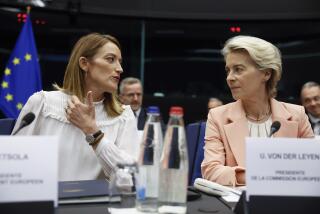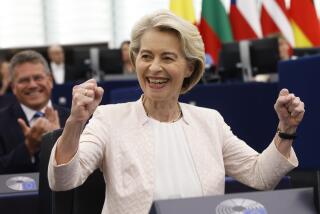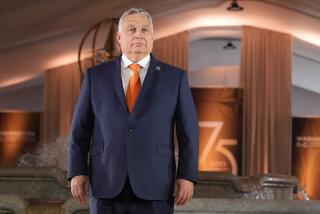Czechs OK pact on unified EU leadership
- Share via
PARIS — With the reluctant approval by its 27th and final member, the European Union put eight years of wrangling behind it Tuesday and took a conclusive step toward turning its patchwork of countries into a more unified political force.
The Czech Republic’s Constitutional Court unanimously rejected a complaint that a treaty to unify and streamline EU decision-making weakened Czech sovereignty. Although still skeptical, Czech President Vaclav Klaus signed the agreement hours later.
The treaty, expected to take effect Dec. 1, creates the position of EU president, with a 2 1/2 -year term, in place of the six-month presidency that rotated among member countries. It also strengthens the role of the EU’s foreign policy chief.
European leaders have struggled to find a structure that balances the need for a cohesive voice with the worries of member nations of a loss of control, especially as the EU grew to include countries such as the Czech Republic that once were part of the Soviet sphere.
“The treaty’s reforms were not a sign of the weakening of the sovereignty, but, on the contrary, can lead to strengthening it in the joint process of an integrated whole,” the statement by the Czech court said.
After Irish voters approved the treaty at a referendum last month and Poland ratified it on Oct. 10, the Czechs were the only holdouts on the Lisbon Treaty.
The treaty replaced a draft European constitution, which was rejected by Dutch and French voters in 2005.
Formation of a cohesive structure for the union, which represents about 500 million people, seemed out of reach for years, damaging the image of the EU and hampering its ability to act, said Susanne Nies, the Brussels director of the French Institute of International Relations, a think tank.
“The EU has kind of been ignored, kind of scorned by foreign powers despite its impressive wealth,” she said. To foreign leaders, it “was not always clear who you were dealing with.”
“The EU is a gigantic economic player, but it has had a hard time asserting itself as a political player,” Nies said.
Policy issues such as climate change and immigration will be decided by majority vote rather than a unanimous decision of EU members. That will speed action, but reform critics in smaller countries fear that larger members will gain more power at their expense.
Klaus won a last-minute concession last week from EU leaders, who agreed to allow the Czech Republic to opt out of an accompanying charter of fundamental rights. He had sought the exemption because of worries over possible property claims by ethnic Germans who were expelled after World War II.
British Prime Minister Gordon Brown praised the Czech approval of the treaty as “an important and historic step for all of Europe.”
“Today is a day when Europe looks forward, when it sets aside years of debate on its institutions, and moves to take strong and collective action on the issues that matter most to European citizens: security, climate change, jobs and growth,” Brown said.
Prime Minister Fredrik Reinfeldt of Sweden, which holds the current rotating presidency, said that Czech approval “opens the way for a more democratic, transparent and efficient European Union.”
Brown’s predecessor, former Prime Minister Tony Blair, was considered a favorite for the position of EU president before fading in recent weeks because of his inability to win over key socialists, some of whom criticized his support of the U.S.-led war in Iraq.
Belgian Prime Minister Herman Van Rompuy, Dutch Prime Minister Jan Peter Balkenende and Luxembourg Prime Minister Jean-Claude Juncker are leading contenders, according to news reports.
The foreign affairs chief will be known as the high representative of the EU for foreign affairs and security policy.
It will take some time for the rest of the world to start seeing the EU as a stronger, single body, Nies said, because positions must be filled and the working relationships within the reformed EU governing bodies must settle into place.
“The treaty is like a new piece of clothing, it also needs to be adjusted to fit the wearer,” she said. “But nevertheless, at one point, we’ll realize that Lisbon was a decisive step in that process.
“And we’ll understand that the EU is a major economic and political reality,” she said.
More to Read
Sign up for Essential California
The most important California stories and recommendations in your inbox every morning.
You may occasionally receive promotional content from the Los Angeles Times.










